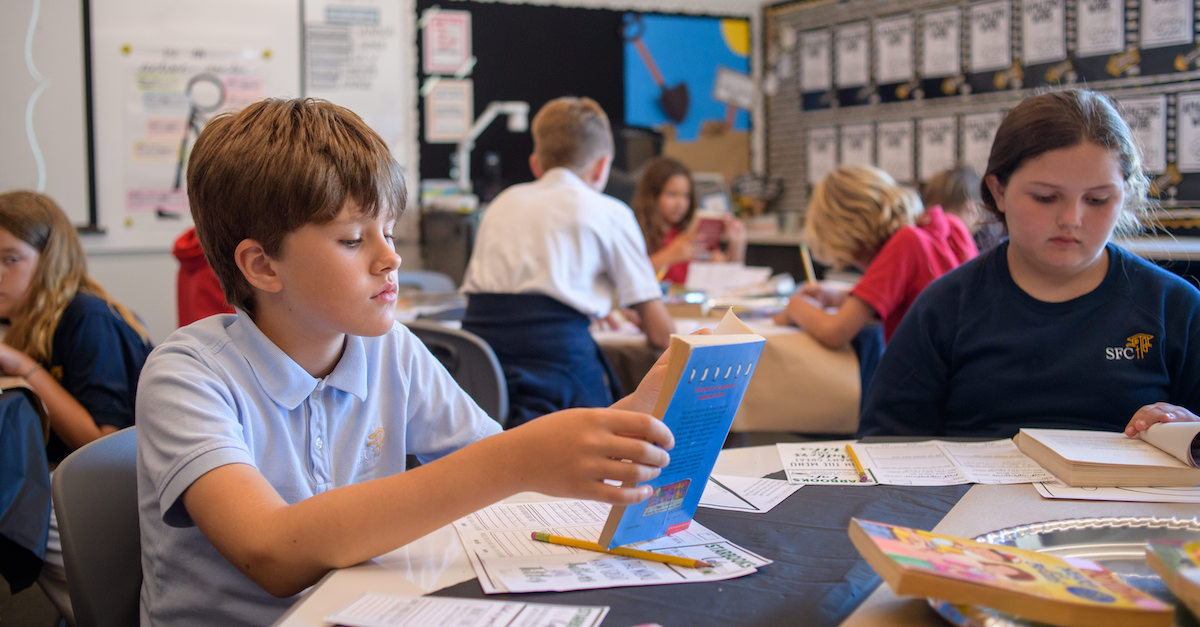Episode Show Notes
In this episode, Mike sits down with SFC’s Head of Schools, Rod Gilbert, for the first installment of the Eagle Perspective’s new mini-series “A Yard of Books.” Mike and Rod introduce the series, discuss the importance of reading as a family, and dive into The Book of Virtues.
Mike Siciliano, High School Dean of Students, has a long history with Sante Fe Christian, sitting in several roles including alumnus, US history teacher, and football coach. As a student, Siciliano felt he had teachers and coaches who personally invested in him and made a huge difference in his life. Now, he tries every day to continue that legacy for current SFC students, live up to the standard his teachers set for him, and have a lot of fun.
Rod Gilbert brings a fresh perspective as SFC’s Head of Schools. As a strong leader with a shepherd’s heart, Rod encourages SFC’s faculty, coaches, and staff to strive for excellence in all they do. At his core, Rod is an educator who wants children and their parents to see the world as something lovely, worth exploring and redeeming through Christ.
Highlights
00:00:46 – Inspiration behind the A Yard of Books series
00:02:44 – Today’s topic is The Book of Virtues by William Bennett
00:04:03 – Premise of The Book of Virtues
00:05:04 – Importance of reading to children
00:06:06 – How The Book of Virtues is organized in age-appropriate categories
00:10:04 – The value of reading aloud
00:10:36 – Discussion about O. Henry’s The Gift of the Magi
00:14:06 – Discussion about Les Misérables
00:18:07 – Discussion of loyalty
Transcript
Mike Siciliano [00:00:05] Welcome back to another episode of the Eagle Perspective Podcast. I’m Mike Siciliano. I’m here with our Head of Schools, Rod Gilbert, and we’re introducing a new series we’re going to be doing. It’s called A Yard of Books. Anyone who’s been paying attention to our podcasts probably knows two things. One, Rod, you love books and reading. They’ve probably heard by now that I’m a football coach. I look at this as I’m bringing the yard, and you’re bringing the books is the way maybe this is happening.
Rod Gilbert [00:00:38] I just love pretending like I’m a football coach.
Mike Siciliano [00:00:41] Maybe I love pretending like I can read.
Rod Gilbert [00:00:43] Oh, there you go. We’re even.
Mike Siciliano [00:00:46] No. Actually, a lot of the books we’re going to talk about are some of my favorites, as well. So, I’m excited to get into this with you and, really, to learn from you, and I know a lot of our listeners will feel the same way. This was your idea. Why don’t you talk about the vision behind this idea of A Yard of Books and what we’re hoping to accomplish?
Rod Gilbert [00:01:04] So, the idea of A Yard of Books is just, hey, these are the books that I grabbed off my shelf that have some meaning to me. Anybody that knows me knows it’d be impossible for me to narrow my top 10 favorites.
Mike Siciliano [00:01:16] Well, I’m looking at one of your bookshelves as we sit in here. It’d be a lot of podcasts. So, to be clear, it’s not like these are your favorite books of all time; they’re just books that are worth discussing.
Rod Gilbert [00:01:33] Well, as a school, obviously, we’re having kids read books. But I think when a community of adults are enjoying books, it has a trickle down effect to all of the children’s hearts. I just want us to highlight some books from time to time in the podcast to just show some families some books maybe they’ve not heard of yet or maybe they remember from years past, and it’ll reconnect with them maybe a book they should have in their home. We called it A Yard of Books, because I think every family should have a bookcase in their home or at least some books in every single room.
Mike Siciliano [00:02:08] I know some of the books we’ve picked are books that are really—I use the word classics loosely around you, because I know you have a classical background—full of tradition, have been meaningful to a lot of people, and can be staples at the home.
Rod Gilbert [00:02:24] Yeah, just good, solid staples that every home should have.
Mike Siciliano [00:02:27] And we’ve picked the term “a yard” because when you actually line these books up, it does measure to three feet. So, it’s a literal yard that we will be discussing in this series. You want to introduce the book we’re going to start with?
Rod Gilbert [00:02:44] I think today we’re going to start with a very important book that helped Angie and I with our children when they were little. It was called The Book of Virtues by William Bennett. I found out today in preparing for this that you actually were aware of The Book of Virtues.
Mike Siciliano [00:03:00] So, my parents used to do this thing that I would always roll my eyes at growing up, which was at least once or twice a week there would be a text and a discussion, a Bible text or something, that we would do as a family. This will shock you. Usually, they would read the text and ask a serious question. I would try to say the funniest thing that came to my head rather than taking it seriously.
Rod Gilbert [00:03:27] That makes perfect sense.
Mike Siciliano [00:03:28] Yeah. But as I grew older, I came to really appreciate this tradition, and we still do it now sometimes. So, The Book of Virtues was one of those books that was on our shelf that my parents loved and that they would pull out and read stories, and we would talk about, and all that.
Rod Gilbert [00:03:45] That’s really cool.
Mike Siciliano [00:03:46] Yeah. So, we got both ends of the spectrum here.
Rod Gilbert [00:03:48] You were receiving The Book of Virtues as a child in your home, and I was giving it to my children as a young 20… I guess I was probably 25, 26 years old when we first came into contact with The Book of Virtues.
Mike Siciliano [00:04:03] Yeah. What is The Book of Virtues?
Rod Gilbert [00:04:05] So, as best as I can understand it, William Bennett and his team just went looking for the essential fables that Americans have often heard. And they arranged these various stories around core character traits like courage or mercy. So, you could take each of the stories and just read it… It’s a great read-aloud with children. Then it just gets them talking about what happened in the story. So, it’s a way to… We all know the story of Hansel and Gretel. Don’t go wandering off in the woods. But Bennett did that with just a very wide range of stories that he thought are part of the moral fabric of our country.
Mike Siciliano [00:04:50] Yeah. So, see, as a kid, I would have taken Hansel and Gretel, and I would have said, “So, obviously, the lesson here is don’t eat bread.”
Rod Gilbert [00:04:56] Exactly. You were a low-carb kid.
Mike Siciliano [00:05:00] Right. Exactly. So, I looked at the list. Some of the ones that stand out to me were the traits like discipline was one, loyalty was one, faith was one. So, it’s a collection of stories that all point back to these values, or virtues, I should say. So, why is it important that a family would do this?
Rod Gilbert [00:05:24] We know this from not just our own growing up and what we hear, but even research shows the most impactful person in a child’s life are the mother and father. It said biblically, the primary mentor of a child’s heart and mind is the mom and dad. We, teachers, are really subcontractors helping the mom and dad do their mentoring. So, for children to hear their parents actually talk about virtue in, really, a fun, entertaining way, even though you’re rolling your eyes from time to time, it’s important for the kids to hear the parents tell stories that the kids can remember around the dinner table or out on the back porch.
So, you may not have realized this as a child. For the listeners, if you take a chapter like loyalty, there might be 18 selections within that 50 pages. They start off small, like maybe a poem, or a sonnet, or haiku. Then it moves to a short story or part of a letter from someone. Then it moves to these larger short stories. You’ll see some Aesop’s fables—The Tortoise and The Hare, whatever. But one of the things that Angie and I loved most about The Book of Virtues is each chapter is arranged age-appropriate. So, the opening of the chapter is built for five-year-olds…
Mike Siciliano [00:06:47] Yeah. See, I had no idea. That’s brilliant.
Rod Gilbert [00:06:49] …and the last story is really high school level. So, we found ourselves as we would work through some of the chapters… The children were little. We would just stop, and we would read it or… I say we. Angie would read. She read the whole book. We would stop where it was age-appropriate, where it wouldn’t confuse them, and then we’d jump to the next chapter. We knew that Bennett and his team had arranged it age-appropriate. For us young parents, we didn’t know what books to go get at Barnes & Noble. It was just nice that someone had arranged an age-appropriate process.
Mike Siciliano [00:07:28] I had no concept of that at all growing up. My little ones now… So, now I have an about to be six and about to be three.
Rod Gilbert [00:07:36] So, they both sit home at night and just read their Bibles, and then they just sing. They make your dinner for you. Is that between 4 p.m. and 7 p.m.?
Mike Siciliano [00:07:44] Yeah. By 6 p.m. they’re already pretty tired of reading their Bibles because they’re 13 hours in. So, we usually don’t make it quite to 7.
Rod Gilbert [00:07:54] We call 4 p.m. to 7 p.m. the bewitching hours because they start to fall apart; Mom and Dad are tired, and then you’re chasing around trying to get a bath after dinner, and then the dishes… Who left the oven on? Am I describing your life?
Mike Siciliano [00:08:09] To a T.
Rod Gilbert [00:08:10] Mine are now adults. But getting them bathed and then, “Okay, can we get one more glass of water after snack?” and then there was the call for milk or whatever. We would curl up. We would just read a book, just read something with them like this, and it calmed everybody’s heart down. TV wasn’t going to do it. So, it’s all the more reason. It was a nice way to close the day with a little entertaining story.
Mike Siciliano [00:08:34] Yeah, that’s good. So, would you guys read the stories out loud together? Did you take turns? Did you have a certain rhythm around it?
Rod Gilbert [00:08:43] The rhythm… Angie, if you hear this podcast, the absolute truth is she did 90 percent of it. At that time I’d be listening in, but she was more of the dominant reader of those times. Angie read the entire Harry Potter series out loud to the children. I was working, trying to start a school in the other room, listening to the whole Harry Potter thing through Angie’s narration.
Rod Gilbert [00:09:10] There are some stories that we think we know but we don’t really know, because they’ve been changed by our modern age. So, the original Pinocchio was written by an Italian. Collodi I think was his name. Then Disney bought the rights a long time ago, and they made it their version. I had an adult friend give me a copy of the original. I have a distinct memory of reading it to my son at night with a flashlight while he was practicing his free-kicks as an eight-year-old out in our front yard. He had built a goal. He would stop me reading and yell at Pinocchio for doing something stupid. He’d be off in the dark somewhere, and I’m just reading it out loud. He and I both have this distinct memory of just reading together, and he was being entertained about whatever dumb things Pinocchio was doing. I was entertained by it.
Mike Siciliano [00:10:04] What’s the value of reading out loud?
Rod Gilbert [00:10:05] There’s something about the shared experience that takes us away from the screens of the day and the fact that I got to be in control of the pace. I think just reading aloud, too, it’s got to be something about acting out the characters for the kid, to show the kid you’re in it. I guess if I was flat and boring, he would have called mom.
Mike Siciliano [00:10:31] Are there any particular stories from The Book of Virtues that stand out to you?
Rod Gilbert [00:10:36] O. Henry’s short story, The Gift of the Magi. Have you ever heard that story?
Mike Siciliano [00:10:41] I have, but why don’t you share with our audience… What an out, by the way, if I hadn’t. I could just say, “I have heard about it, but please share with our listeners.”
Rod Gilbert [00:10:50] It’s one of the more famous short stories in American folklore. It’s a very young married couple, very, very poor, in the 1920s. They have no money for Christmas presents. She has absolutely gorgeous hair. So, she goes to the wig maker, and sells her hair, and buys him a gold chain for his pocket watch. She’s so proud of it. Then he comes home that night for Christmas Eve. He has sold his pocket watch to buy her fancy combs for her hair. The mutual sharing of each other’s prized possessions for each other was just a great story.
Mike Siciliano [00:11:37] It’s a beautiful story.
Rod Gilbert [00:11:38] But it’s those kind of things that kids don’t forget. They don’t forget little stuff. There’s some that are really attached to them like that one did for me. I had no money my junior year in college, and I was trying to express my love for this amazing girl in college named Angie. Very intimidating because she’s so pretty. All my friends said, “She’s out of your league,” but I thought I would take a shot at it. So, we were dating for just a while. I was very nervous. So, I went to the school library and checked out a copy of The Gift of the Magi. I used my printer card with the copier, and I literally printed each page. Then I cut out each page, and stapled it, and wrote on the front of it, “Merry Christmas. Rod.” That was my Christmas gift to Angie when we were dating.
Mike Siciliano [00:12:30] All the ladies listening are in tears right now.
Rod Gilbert [00:12:33] She has it in her little keepsake box. She mentions it every Christmas.
Mike Siciliano [00:12:37] That’s awesome. That’s beautiful.
Rod Gilbert [00:12:39] Well, it was beautiful, but I was a dang fool just madly in love and not that bright. So, The Gift of the Magi means a lot more in our home, because Angie’s retold the story that O. Henry told, and then she’s retold that I did that.
Mike Siciliano [00:12:52] Which is beautiful for your family. It’s part of that tradition.
Rod Gilbert [00:12:56] Now they retell the story. “Dad did something really weird. He was a confirmed nerd a long, long time ago.”
Mike Siciliano [00:13:04] So, the cynic would say about that story, “What’s the point of that story? They had two prized possessions, and now they have zero.”
Rod Gilbert [00:13:12] That’s right.
Mike Siciliano [00:13:13] So, if your five-year-old says, “Wait. You told me this was a happy story. It seems like a sad story. They both lost two things that they love,” what’s the message?
Rod Gilbert [00:13:24] The message is they were willing to compromise the worldly possessions they’d love most for the covenant marriage that they had for each other. So, I imagine that their marriage grew stronger as a result of that by sacrificing a prized possession. Of course, I think one of our kids probably said, “Well, her hair is going to grow back.”
Mike Siciliano [00:13:46] But I think those types of lessons really are the thing that stood out to me as a kid, which was it’s not yes, they both end up with “nothing” but the value of knowing that you’re in a relationship where you’re both willing to sacrifice material things for each other outweighs even having those things.
Rod Gilbert [00:14:06] The relationship is more important than the things. Now, this is not The Book of Virtues, but I never read Les Misérables. It’s 1300 pages.
Mike Siciliano [00:14:16] Before you go too far, that is in A Yard of Books.
Rod Gilbert [00:14:19] Yeah, I know. I stuck it in there on purpose.
Mike Siciliano [00:14:21] So, don’t tell too much about it now.
Rod Gilbert [00:14:23] I won’t. I’m only 200 pages in. My mom and I had agreed to read the whole thing together. She read the whole thing in 30 days. She called me. I’m feeling a little guilty. It’s like, “Rod, I read the whole thing.”
Mike Siciliano [00:14:34] Well, she doesn’t run a school.
Rod Gilbert [00:14:36] I know. She said that. She’s a saint. You ought to meet her. But there’s a moment in that story that you may recall from the musical where Jean Valjean steals the candlestick, and then he gets caught, and he comes back. The bishop, who could have put him in jail forever, says, “You forgot the other one. You forgot the candlestick,” and he gave him the other one. So, good came from that bishop giving up a material good for an eternal good. So, this is just a power story, I think for us as a school, it’s us nurturing and encouraging the parents and our employees or team members just to find ourselves to be rich in reading, just reading anything.
Mike Siciliano [00:015:22] How important is it that they actually remember the stories two decades later?
Rod Gilbert [00:15:27] Not that much. It’s more of the mode that mom and dad had some deep values down in their heart and soul. It was important to the child that my mom and dad took time out of their day to just read stories to us, and the memory of that is far deeper. So, for me personally, I can remember a little purple book that on the front of it said, Bedtime Stories, that after my brother and I would crawl into bed, my mom would crack open Bedtime Stories. For this podcast, I looked it up on used books. There’s actually five volumes of Bedtime Stories, and I don’t remember one story from those moments. I just know that my mom knew that it was important to teach me about courage or whatever it was in those stories that it was important to her. It was entertaining enough to it’s how I finished my day as a child.
You want to cultivate a child’s desire to pick up a good book because without books as adults, you’re really living a short life. You’re short-changing yourself if you think that all of life is going to come through Twitter, and Facebook, and your cable news.
Mike Siciliano [00:16:42] There’s only like 85 percent of life comes through those things.
Rod Gilbert [00:16:45] Only 85 percent, yeah.
Mike Siciliano [00:16:46] Yeah. Not to dovetail into a tangent that I’ll get yelled at about later for getting us off-topic, Rod. It’s not any different than in a lot of ways what we do as a school with content. Kids don’t remember every last bit of content.
Rod Gilbert [00:17:02] Oh, my gosh, I can’t believe you said that. You’ve now given the secret away.
Mike Siciliano [00:17:05] I know they’re not going to remember every math problem that we’ve presented…
Rod Gilbert [00:17:10] How dare you!
Mike Siciliano [00:17:11] …but there are principles and critical thinking practices or brain patterns that are developed and solidified long after you forget the content.
Rod Gilbert [00:17:22] That’s right, 80% of the content, I think, is what research shows. Eighty percent of the content is lost on children by the time they’re adults. What we’re creating are sinews in their soul, in their mind, of how to attack problems, how to live a virtuous life, how to live a life of courage, or how to solve problems – whether it’s math, engineering, law firms, or plumbing, whatever it is they’re doing. A lot of schooling is training the muscles in the soul on how to attack a problem or how to work with a group of people.
Mike Siciliano [00:17:52] Yeah. So, this book, or this, really, collection of stories is a tool for parents. It’s a conversation starter that over time we develop this muscle of okay, so what is courage? What does it look like to be courageous?
Rod Gilbert [00:18:07] What was one of the chapters, when you were looking at it, that stands out in your mind?
Mike Siciliano [00:18:11] Well, the loyalty one was interesting to me. There’s so many nuances to loyalty. I got thinking about, “So, what is loyalty? Is there a simple definition?” I think the value of having a whole series of stories on loyalty to get… Well, does that mean you always agree with the person or…?
Rod Gilbert [00:18:30] I hope not.
Mike Siciliano [00:18:31] Right. Of course not. So, it just stood out to me as like, “Huh, interesting choice,” but as I thought about it, it was like, “Gosh, maybe that’s even more important now than when I was a kid,” as we have all these connecting points online, and social media, and some sort of self-centered what’s best for you, do whatever’s best for you, and you got to look out for number one.
Rod Gilbert [00:18:57] Yeah. We’ve found a new level of narcissism and self-interest, and loyalty implies that I, as a human, should be more human. It means to keep short accounts with people, forgive people, and then hope that they forgive me from time to time because I’m going to flub it up, too. That’s being lost, I think, in some of our humane moments here. I think it’s loyal to principles, and then you partner with people along the way.
Mike Siciliano [00:19:24] Well, thank you once again for joining us for our Eagle Perspective Podcast and our new series, A Yard of Books. We look forward to revisiting this topic. You can listen to more of this series or any of our other Eagle Perspective Podcast episodes on Apple Podcasts, Spotify, or other places where podcasts are found. We look forward to joining you once again in the near future.






